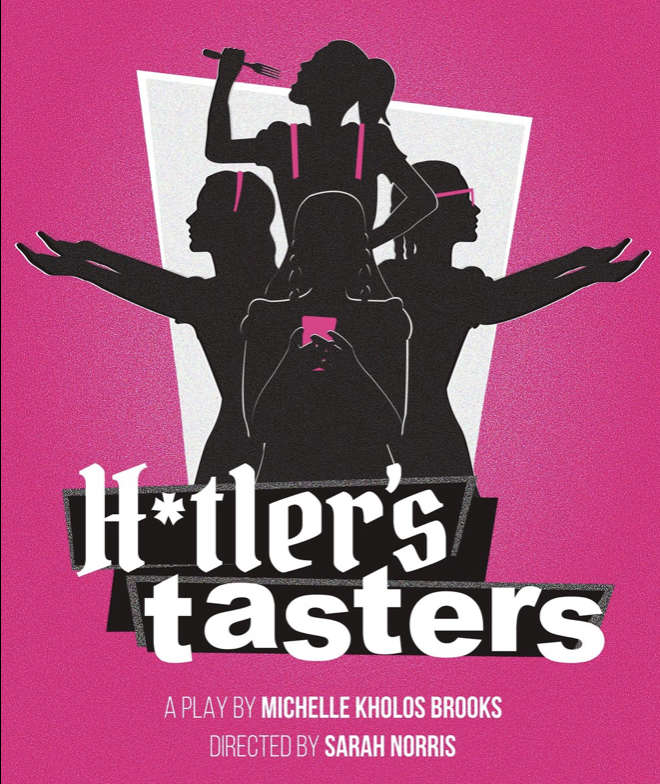H*tler’s Tasters – Thought Provoking and Frightening – With A Nasty After Taste
By Sue Weston and Susie Rosenbluth – Two Sues on the Aisle
Girls will be girls, even when placed in an unfathomable situation, like being forced to accept the “honor” of serving the Third Reich. The job was simple: as Hitler’s tasters, they ate three meals a day, then waited an hour to see whether or not the food contained poison. These girls spent their days sequestered in a small room awaiting the arrival of their meals, accepting the food as a soldier would a dangerous mission and then waiting to see if death would be their reward.
H*itlers Tasters is a dark comedy, based on historical events as told by Margot Wölk, the sole surviving member of the team of Hitler’s food tasters, who performed their ghastly service at the Wolf’s Lair, Poland, Hitler’s Eastern Front headquarters in East Prussia (now Poland). The Führer demanded that only young women of good German stock sample each of the meals prepared for him, in case the Allies—or some of his own—were trying to poison him.
Playwright Michelle Kohlos Brooks, herself of Ukrainian-Jewish descent, envisions H*tler’s Tasters as a call for attention to the dangers of complacency. Brooks’ grandparents escaped the pogroms. She says looking at the world situation terrifies her, especially when she speculates about what is possible when people calmly look the other way, believing the lies and manipulations told by world leaders.
Just Like Soldiers
In H*tler’s Tasters, she illustrates how society can devolve when key players deny the truth. The girls cite their families’ pride, and their willingness to sacrifice their daughters when they were selected to serve the Führer. The audience is left wondering if this was self-preservation, misplaced patriotism, or foolish ignorance?
While Ms. Brooks believes she is issuing a wake-up call, American audiences are justified in finding the premise disturbing. The girls were given no more choice in selecting their place of service than German soldiers were. The only freedom left to them was whether to view it as honorable service or forced labor.
The discord between the innocent girls and the controlling leaders waiting just outside the small room forces the audience to recognize the difference between choosing to risk one’s life while serving an honorable cause and being compelled to do so in the service of unthinkable evil.
Trying to Justify
For Ms. Brooks, H*tler’s Tasters is a cry for change, bringing awareness and warning society of the potential consequences of failing to speak up and protect the freedoms afforded in a democracy.
She attempts to render H*tler’s Tasters relatable by superficially changing the perspective. She uses the events of 1944 but makes her girls behave like contemporary 21st-century teenagers with their devices and nuances. She imagines their conversations taking place among three young teenagers with their cell phones—ones that can take pictures and play music but cannot communicate cries for help. To pass time between meals, the girls dance, pose for selfies, play Truth or Dare, giggle, and gossip. With a nod to the 1940s period, they fanaticize about Frank Sinatra, Fred Astaire, Clark Gable, and Hitler.
Like all adolescents, these girls repeat what they have heard at home, which for them includes hatred for Jews, the importance of serving their country, and how they will be viewed as heroines for their efforts. They are aware of the risks but choose to minimize them. They’ve been told that compared to other people’s experiences during the war, they have it easy. While others are starving, they receive three meals daily.
But when the girls face the truth that any meal could be their last, they cry tears of joy, elated when the alarm sounds an hour after the meal, they are still alive.
Tattling and Consequences
At first, the girls, like immature teenagers everywhere, don’t grasp the significance of their actions. They feel free to threaten to tattle on one another about incidents such as prior associations with Jews or interest in American culture. But that changes slowly as they realize they have only each other in the face of death.
One girl learns that her father, a senior leader, is suddenly missing. He may have lost faith in the cause and deserted, or he may have been killed. The taster leaves for the night and never returns. She is replaced by another teenage girl who has been forced to accept the honor. One is no different from another; any German girl will do.
The girls try to maintain political detachment when they learn there is probably no antidote for the poison they may ingest at any time. If they eat it, they will be left to die. Even if there is no poison, they have suffered the death of childhood’s innocent belief that the adults in charge will care for them.
Margot Wölk, 95, Survivor
In a 2013 interview, Margot Wölk, then 95, shared her experiences as a taster for Hitler, a job she performed with a team of 14 other young girls.
The only survivor of the group, Ms. Wölk, who died in 2014, was saved because she was not on Joseph Goebbels’ train headed for Berlin. The others were shot by the Russians.
Like Hitler, she and the other tasters lived on a vegetarian diet consisting of rice, pasta, noodles, and fruit. She made clear that none of the tasters enjoyed it.
“Some of the girls started to shed tears as they began eating because they were so afraid,” she said. “We had to eat it all up. Then we had to wait an hour, and every time, we were frightened that we were going to be ill. We used to cry like dogs because we were so glad to have survived.”
In addition to risking their lives as tasters, the girls were forced to accept sexual abuse and rape.
Amazing Performers – without Battle Cry
The extremely talented all-female cast provides insight into the tasters’ scattered mental state, trying to make sense of an inconceivable situation. They perform on a minimal stage with only a table and three chairs as props. The play runs 90 minutes, without intermission, and ends abruptly, without closure.
The show might have been improved if, like other plays based on historical fact, H*tler’s Tasters had included Ms. Wölk’s testimony. Instead, audiences have to depend on Ms. Brooks’ “Statement from the Playwright” to provide context, a bone-chilling subtext that should have been part of the narrative.
It would have provided a glimmer of hope to know that the tasters did not die in the performance of their duties. With the exception of Ms. Wölk, they really were killed by Hitler’s enemies, but with bullets, not by poison, and their deaths did not save their Führer. If these facts were part of the play, the ambiguity might have made for more thought-provoking theater and heightened Ms. Brooks’ intention to inspire speaking out while the opportunity exists. As it is, H*tler’s Tasters failed to make its full impact.
***
Two Sues on the Aisle bases its ratings on how many challahs it pays to buy (rather than make) in order to see the play, show, film, or exhibit being reviewed.
H*tler’s Tasters received 2 Challahs










